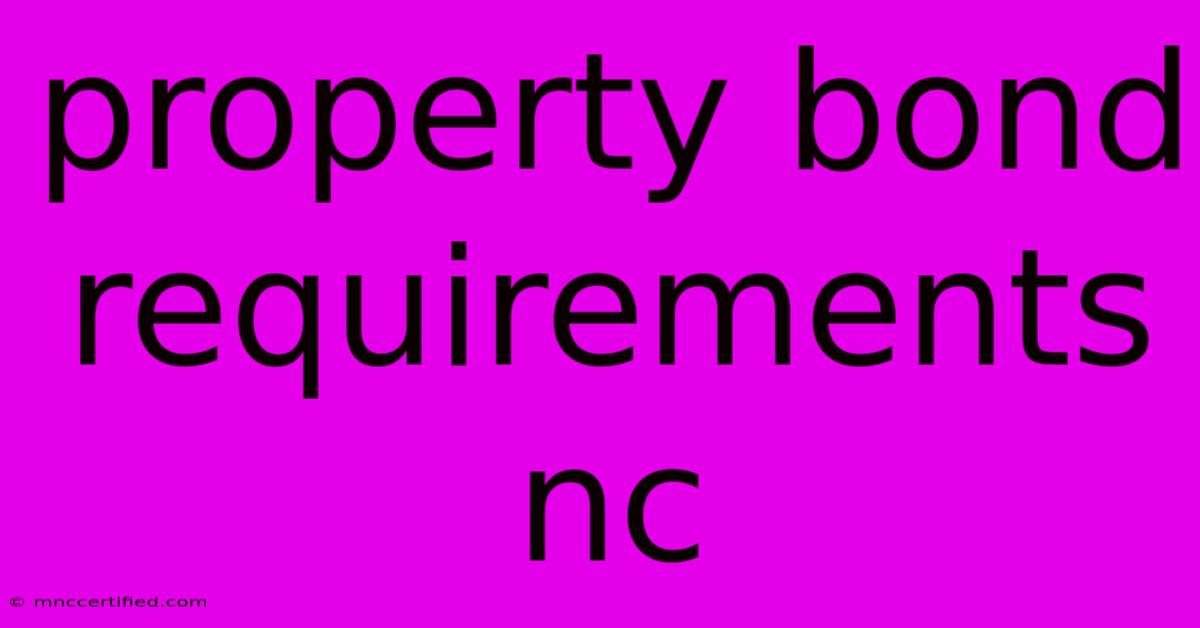Property Bond Requirements Nc

Table of Contents
Property Bond Requirements in North Carolina: A Comprehensive Guide
Finding the perfect rental property in North Carolina is exciting, but understanding the property bond requirements is crucial before you sign that lease. This guide will walk you through everything you need to know about security deposits and property bonds in NC, ensuring a smooth and stress-free move-in process.
What is a Security Deposit (or Property Bond) in North Carolina?
In North Carolina, landlords are legally permitted to require a security deposit from tenants. This isn't just a random fee; it's a financial safeguard protecting the landlord against potential damages to the property beyond normal wear and tear during your tenancy. While often referred to as a "security deposit," the term "property bond" is also frequently used and is functionally equivalent. For the sake of clarity, we will use the terms interchangeably throughout this article.
Key Differences from Other States: North Carolina's laws regarding security deposits are specific. Understanding these nuances is critical to avoiding disputes with your landlord. Unlike some states with more lenient rules, NC has clear guidelines on how these funds should be handled.
How Much Can a Landlord Require in North Carolina?
The amount a landlord can request as a security deposit in North Carolina is generally limited to one and one-half (1.5) months' rent. This is a key figure to remember and negotiate if necessary. However, there are exceptions, particularly for properties with unique features or amenities. Always review your lease agreement thoroughly.
What Does the Security Deposit Cover?
Your security deposit in NC isn't a free pass for damage. It’s designed to cover costs associated with:
- Repairs: Fixing damages beyond normal wear and tear, such as holes in the walls, broken appliances (not due to normal use), or damaged flooring.
- Cleaning: Excessive cleaning needed beyond what's considered routine. Leaving the property excessively dirty could impact your deposit refund.
- Lost Keys: Replacing lost keys or locks.
- Unpaid Rent: In some cases, unpaid rent may be deducted, but this is usually outlined separately in the lease.
What it doesn't cover: Normal wear and tear (e.g., minor scratches on walls, faded paint).
Returning Your Security Deposit in North Carolina: Your Rights
North Carolina law mandates a specific procedure for returning your security deposit. Landlords must:
- Provide an itemized list of deductions: This list needs to be detailed and justified. A vague explanation isn't acceptable. Demand clarity if you disagree with any deduction.
- Return the deposit within 30 days of your move-out: This deadline is crucial. If your landlord fails to comply, they could face legal repercussions.
- Forward the deposit via certified mail: This ensures proof of delivery and protects both parties.
What to Do If You Disagree with Deductions
If you believe your landlord's deductions are unfair or unjustified, don't panic. You have legal recourse:
- Review your lease agreement: Carefully examine the terms of your lease regarding damages and responsibility.
- Negotiate with your landlord: Try to resolve the issue amicably.
- Contact the NC Attorney General's Office: If negotiation fails, seek assistance from the state's Attorney General. They can provide guidance and potentially intervene.
- Consider Small Claims Court: For disputes involving relatively small amounts of money, small claims court might be a viable option.
Proactive Steps to Protect Your Security Deposit
Preventing disputes is always better than resolving them. Consider these proactive measures:
- Thorough move-in inspection: Document the property's condition with photos and a detailed checklist, signed by both you and the landlord.
- Maintain the property: Keep the property clean and in good repair during your tenancy. Address minor issues promptly.
- Take photos before moving out: This provides visual evidence of the property's condition when you vacate.
- Obtain a signed receipt confirming the return of your deposit: This is crucial for your records.
Understanding property bond requirements in North Carolina is vital for renters. By being proactive, informed, and aware of your rights, you can ensure a smoother transition and protect your financial interests. Remember to always carefully read your lease agreement and consult with legal professionals if you have any questions or concerns.

Thank you for visiting our website wich cover about Property Bond Requirements Nc. We hope the information provided has been useful to you. Feel free to contact us if you have any questions or need further assistance. See you next time and dont miss to bookmark.
Featured Posts
-
Ricky Gervais Six New Tour Dates Announced
Nov 28, 2024
-
Whats Open Thanksgiving Day 2024
Nov 28, 2024
-
National Fog Alert Yellow Status
Nov 28, 2024
-
Barry Bonds Fleer Rookie Card
Nov 28, 2024
-
D B Cooper A Familys Revelation
Nov 28, 2024